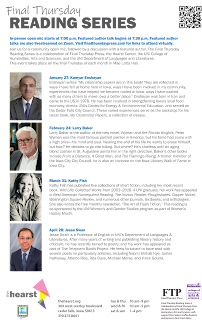Jesse Swan has been a professor of English at UNI since 1998, where his research and teaching has focused on Renaissance and early modern English literature and culture. He has recently turned to poetry, and his creative writing has appeared as part of the Telepoem Booth project. He will be the featured reader at the final event of the 2022-23 Final Thursday Reading Series on April 28 at the Hearst Center for the Arts. The night starts at 7:00 p.m. with an open mic. Attendees are welcome to share their best five minutes of poetry, fiction or creative nonfiction. Jesse Swan takes the stage at 7:30. Swan’s featured reading will also be live Zoomcasted. Click HERE for a link to the 7:30 featured reading.
The following interview was conducted by Jim O’Loughlin.
The following interview was conducted by Jim O’Loughlin.
Jim O’Loughlin: For much of your career you’ve been a literary critic and literary historian. What led to your interest in writing poetry?
Jesse Swan: I guess I kind of see them as of a piece. Of a piece with reading, which is what I love. There are lots of identities I feel, but “reader” has to be one of the most longstanding and perhaps the keenest.
About reading and writing poetry. Hmm. I have composed poetry as a practice of reading for almost as long as I’ve been reading. One way I get into an author or work is to compose poetry inspired by the author or work. Sometimes it’s the historical moment I compose a poem about. I have written other forms and genres as a practice of reading, but “poetry” is the main one, perhaps because I love reading poetry so much. Indeed, most works I love I call “poetry,” even if they’re novels, such as Joyce’s Ulysses, or plays, like Sarah Ruhl’s Eurydice, or essays, like David Rakoff’s Don’t Get Too Comfortable.
. . . . [thoughtful pause] . . .
A few years ago, and I’m not at all sure why or how, but it was something like a tickling bee in my invisible bonnet, it occurred to me to see about “completing” one of my poems or several of my poems. I had never thought about completing a poem any more than I think of completing a reading, but suddenly I did. I feel that a poem is completed when it is read or heard by someone else. I think this is what has, most immediately, led to my circulating some of my poems.
JO: Do you find connections between your creative and critical work, or is your poetry from a very different part of your imagination?
JS: Oh, yes, absolutely. I know most people think and feel that a scholarly work of bibliography, for example, and a romantic sonnet are two entirely different and unrelated forms of experience and knowledge and expression, but I see them both as entirely imaginative, contingent, and humane. It was imagining the various facts informing W. W. Greg’s theory of copy-text the way I imagine poetry, notably poetry heavy in imagery and teeming with metonymy, for example, that I came to really understand Greg’s theory and principles of copy-text. Similarly, considering the vast possibilities of a rich poem, such as Paradise Lost, the way I imagine the myriad interpretations of the historiography of Michel Foucault, for example, curiously liberates the “poetry” from the conceptual and experiential confines it is sometimes placed in.
In my scholarship, I have hoped to provide reliable facts for others to use in contemplating all the things we consider when reading literature, and in my criticism, I have aimed at providing certain moral and ethical interpretations of authors and works that I feel match the feelings and ideas of the authors. With composing and completing poetry, I hope to inspire people to read and to compose poems and to think, generally, poetically.
JO: What poets have influenced your creative writing?
JS: I know you must mean published poets, and I will mention a couple, yet I want to give primary place here to my kindergarten teacher, Sister Dolores Muñoz of the Mercedarian Sisters of the Blessed Sacrament. Of the many influences she had on me, one was giving me the sense of being a poet. I have always remembered Sister Dolores saying to me, approvingly and with remarkable affection, “why, you are a poet.” I was writing some elementary reading material, and I had no idea that I was being observed, until I heard her gentle exclamation. When I feel that I am no poet, I remember this moment. Since Sister Dolores, many others have influenced me, notably Naomi Shihab Nye, who used to give poetry readings and workshops when I was a kid and young adult, and Alberto Rios, who was a professor of poetry when I was in graduate school. As much as in their poetry and in their advice for writing -- and reading -- poetry, their softly charismatic presence has charmed and inspired me.
JO: Kudos to Sister Dolores! Do you see your work eventually resulting in a collection, or do you think of your poems as standalone efforts?
JS: I think the poems I select to circulate in order to be completed by readers or auditors are really best read in a collection. A collection might be the sort of reading I’ll be doing for the Final Thursday Reading Series, but mostly, I think, as a chapbook or other sort of group of several poems. That said, mostly people encounter my poems as isolated from others, as in workshops or magazine publication, and this has its own curious effects.

